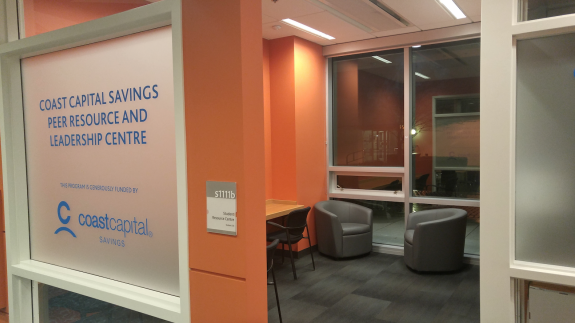By Megan Lambert (The Cascade) – Email
If you’re curious about the bright orange corner beyond the glossy lounge in the Student Union Building, it’s intended to be a directory of UFV where you can ask questions or find support if you’re having a tough time.
The Peer Resource and Leadership Centre (PRLC) opened in August 2015 and is available to students — but isn’t operating at full capacity yet.
It was based on a report by UFV student Jasper Moedt, who saw a couple of universities in Alberta host a peer-to-peer referral service. The idea was picked up by Student Life and, with some additions to Moedt’s original idea, received funding last year and was able to materialize.
The centre is funded by a renewable grant from Coast Capital Savings. UFV received $50,000 for one year and can apply for that same amount again for another three years — a total of $200,000 over a four-year period.
Student Life recently sent in their application for the second year of funding. Director of Student Life and Development Kyle Baillie says that even though the centre has been held up by the process of training and hiring staff, he believes that the application will be approved.
“We’re a bit delayed,” he says, “But I think we’re doing what we said we’re going to do.”
He says other than some extra start-up costs for this year, roughly half of the grant is spent on staff and the other half on training.
Staff at UFV have so far been trained in suicide prevention, conflict resolution, and mental health first aid — but more training in Positive Space for LGBTQIA students, first aid, and Food Safe will be available to them. Baillie says that sending a few people to training will allow them to teach those at the centre and is also cost-efficient. “Rather than just sending a bunch of people for training, we’re trying to send people to be trainers in that skill” he says.
Baillie says that students are already coming to the PRLC to seek support and that the centre is planning to record its usage rates to see the services that are in demand. “We’re starting to get a sense for what types of questions we’re getting [and] types of places we’re referring to commonly. We’re starting to track data,” he says.
He then notes that the collection of PRLC data will respect student privacy and confidentiality.
To oversee some of the operations at the centre itself, PRLC Assistant Ashley Hayes was hired in December and will work with two paid work-study students and student volunteers.
The work-study students were hired at the end of January and are gathering research material for the centre. “They have been working on finding and creating content for our webpage,” Hayes says.
“Both work-study students have also been doing research on similar programs so we can see the various training models being used across North America as we develop our own.”
Currently, University Relations is developing a website for the PRLC. Once the website is active (Hayes estimates a few weeks), the centre will start recruitment for 20 to 30 student volunteers and accept applications until the end of August.
“We expect to be fully operational for the start of the Fall 2016 semester,” she says.
With files from Michael Scoular.



